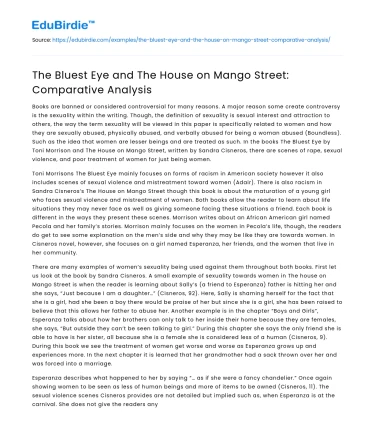Books are banned or considered controversial for many reasons. A major reason some create controversy is the sexuality within the writing. Though, the definition of sexuality is sexual interest and attraction to others, the way the term sexuality will be viewed in this paper is specifically related to women and how they are sexually abused, physically abused, and verbally abused for being a woman abused (Boundless). Such as the idea that women are lesser beings and are treated as such. In the books The Bluest Eye by Toni Morrison and The House on Mango Street, written by Sandra Cisneros, there are scenes of rape, sexual violence, and poor treatment of women for just being women.
Toni Morrisons The Bluest Eye mainly focuses on forms of racism in American society however it also includes scenes of sexual violence and mistreatment toward women (Adair). There is also racism in Sandra Cisneros’s The House on Mango Street though this book is about the maturation of a young girl who faces sexual violence and mistreatment of women. Both books allow the reader to learn about life situations they may never face as well as giving someone facing these situations a friend. Each book is different in the ways they present these scenes. Morrison writes about an African American girl named Pecola and her family’s stories. Morrison mainly focuses on the women in Pecola’s life, though, the readers do get to see some explanation on the men’s side and why they may be like they are towards women. In Cisneros novel, however, she focuses on a girl named Esperanza, her friends, and the women that live in her community.
Save your time!
We can take care of your essay
- Proper editing and formatting
- Free revision, title page, and bibliography
- Flexible prices and money-back guarantee
There are many examples of women’s sexuality being used against them throughout both books. First let us look at the book by Sandra Cisneros. A small example of sexuality towards women in The house on Mango Street is when the reader is learning about Sally’s (a friend to Esperanza) father is hitting her and she says, “Just because I am a daughter…” (Cisneros, 92). Here, Sally is shaming herself for the fact that she is a girl, had she been a boy there would be praise of her but since she is a girl, she has been raised to believe that this allows her father to abuse her. Another example is in the chapter “Boys and Girls”, Esperanza talks about how her brothers can only talk to her inside their home because they are females, she says, “But outside they can’t be seen talking to girl.” During this chapter she says the only friend she is able to have is her sister, all because she is a female she is considered less of a human (Cisneros, 9). During this book we see the treatment of women get worse and worse as Esperanza grows up and experiences more. In the next chapter it is learned that her grandmother had a sack thrown over her and was forced into a marriage.
Esperanza describes what happened to her by saying “… as if she were a fancy chandelier.” Once again showing women to be seen as less of human beings and more of items to be owned (Cisneros, 11). The sexual violence scenes Cisneros provides are not detailed but implied such as, when Esperanza is at the carnival. She does not give the readers any details other than he kissed her and wouldn’t let her go. All she kept saying was “Sally, you lied, you lied.” this makes the readers think about how Sally had told Esperanza that sex was a joyful thing and put it together that the boy had not only kissed her but had raped Esperanza as well.
In The Bluest Eye by Toni Morrison women aren’t seen being treated as badly as they are in Cisneros’s novel. Morrison focus is not women sexuality; however, we do see men oppressing women through the use of sex as well as hating women for not being men. The men that are seen doing this have had bad sexual experiences during their life that have caused their hatred for women. Cholly, for example was caught by two white men while having sex and turned the hatred he had for the white men onto the girl he was with (Morrison, 150) this event is the probable cause of Cholly raping his daughter Pecola. Morrison describes this seen with as few of details as possible while still getting the scenes message across. Cholly does not rape her because he enjoys sex, we see he does it because Pecola does not enjoy what he is doing. Morrison writes, “The rigidness of her shocked body, the silence of her stunned throat, was better than Pauline’s easy laughter had been.” He wants Pecola to feel the way he did during his sexual experience, humiliated and worthless (Morrison, 162). This experience also shows what society thinks of women because when Pecola becomes pregnant she is the one blamed. Morrison provides a conversation between people in town saying things like, “She carry some of the blame.” and “How come she didn’t fight him.” These people do not know what happened to her, they do not consider how a young girl might not able to fight a man off (Morrison, 189). Another scene showing the feelings toward women is in a scene where Mr. Henry touched Frieda and she says to Claudia, “I don’t want to be ruined!” (Morrison, 101). Frieda saying this gives us an example into how women are seen as sexual objects only good for what they can provide sexual wise.






 Stuck on your essay?
Stuck on your essay?

